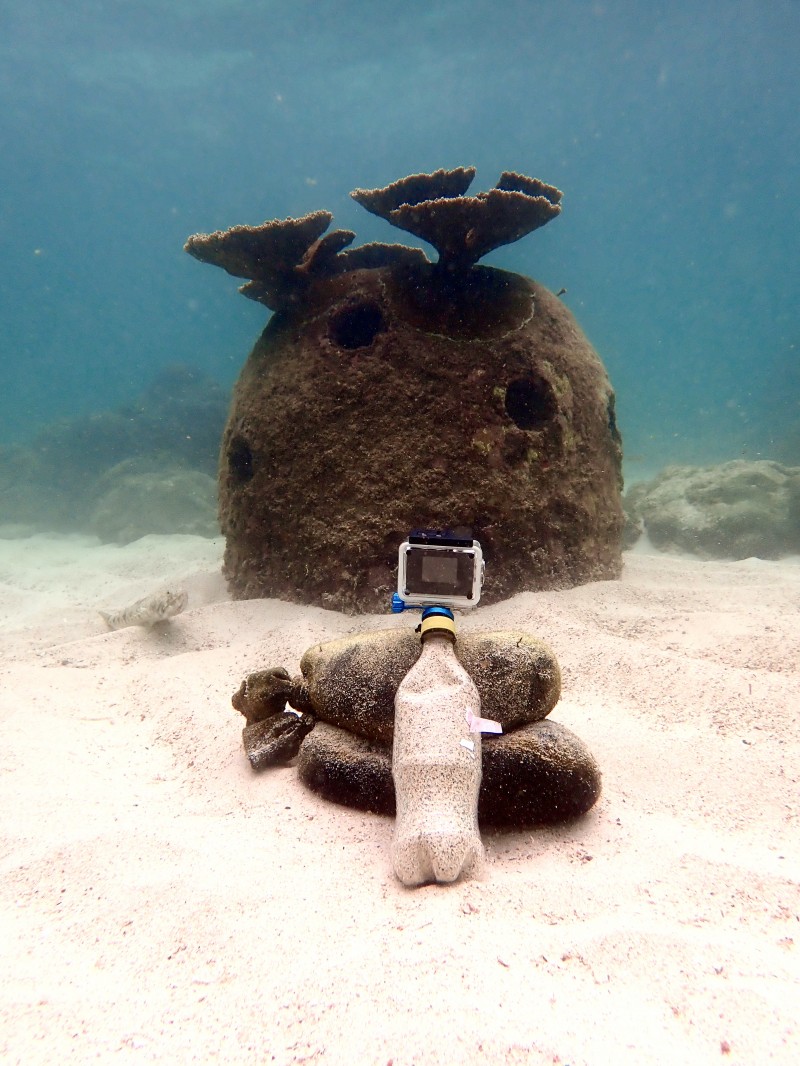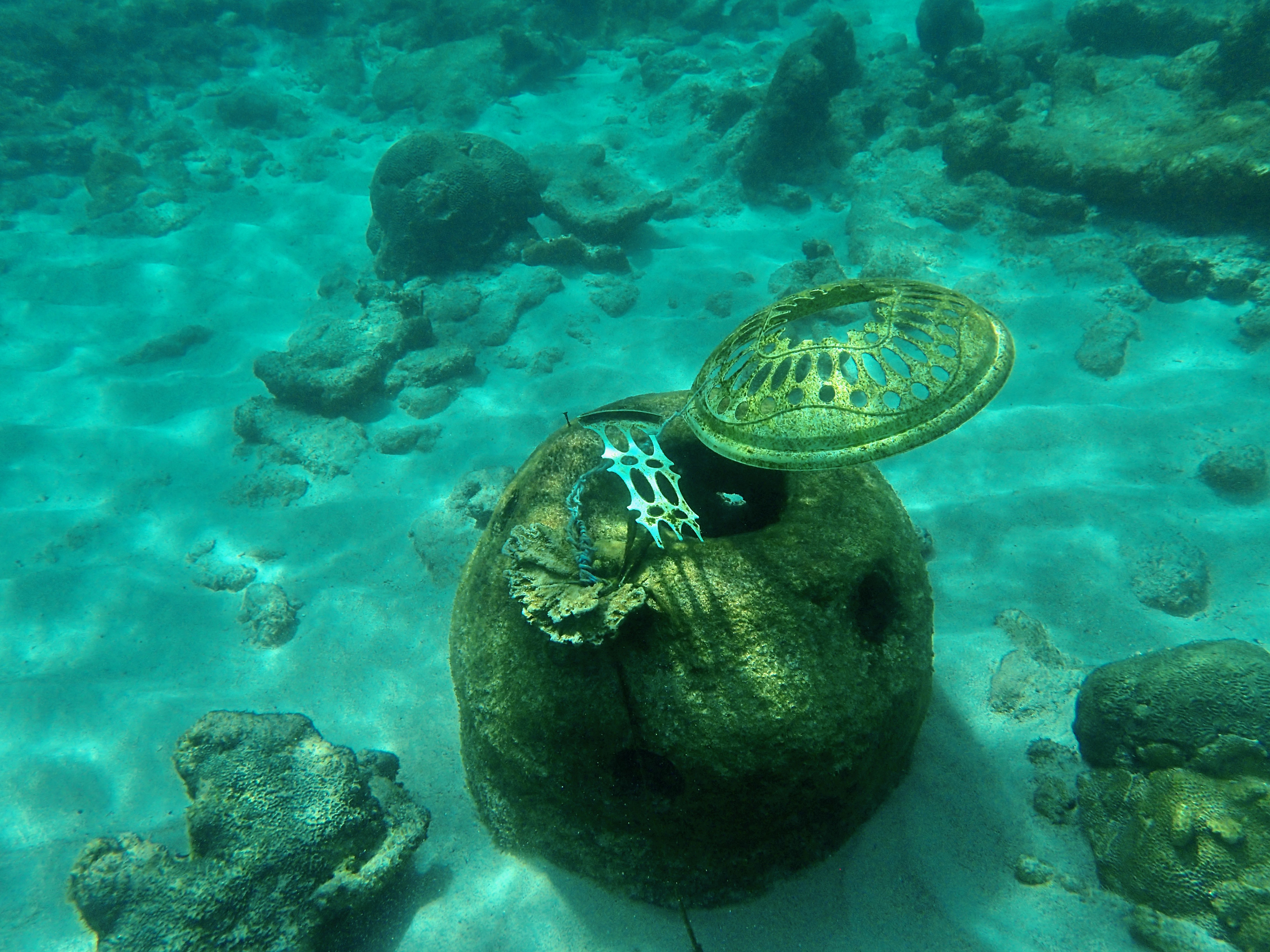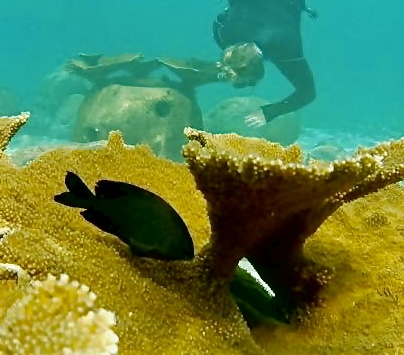Fish Hives into the Caribbean sea
Kathryn Whittey
Cardiff University

Corals create complex, 3-dimensional structures which then provide a plethora of habitat space for marine life. Coral reefs are some of the most diverse ecosystems in the world and despite only covering 1% of the ocean they support up to 25% of life in the sea. But, unfortunately due to climate change and a number of other anthropogenic stressors coral reefs are declining. This is not only impacting the marine life that directly depends on the corals for habitat, but it also affects communities who depend on the reefs for livelihood.
During my time in Tobago, it was clear that many fishers and members of the community, aware of their declining reefs, were keen to do something to help but struggle to see what their options are. I’d seen artificial reefs been used as one technique to restoring coral reef habitat. These structures, often made from concrete, provide an alternative habitat space that was once provided by coral. Additionally, as concrete is porous, over time natural benthic settlement of organisms. At home in Wales, I started to ask around about concrete, and together with my family, in our garden, we designed a concrete structure which mimics some elements of the corals I’d seen on the reef. We made 1-metre-high concrete domes with a hollow inside. We knew we wanted the hollow inside to provide refuge for fish, and it was important that the whole process could be repeated on the small island of Tobago using minimal resources. We landed on an inflatable mould, a space hopper! These could be take out with us in our suitcases. Then, we layer concrete around the spacehopper, placing in small pieces of wide bamboo to create holes that would lead to the inside cavity. The resulting structure we named a Fish Hive!

In 2019 we successfully deployed 12 Fish Hives into the Caribbean sea in Tobago. The structures were seeded with corals and the spacehoppers, having survived several rounds of building, went to the local children in the village. Because of the COVID-19 pandemic we were unable to return to Tobago to see the structures in person, but I completed the chapter for my PhD using footage collected by our collaborators Environmental Research Institute Charlotteville ERIC.
While the installation of artificial reef structures is a positive step toward reef rehabilitation, effective monitoring is crucial to assess their success and ensure their long-term sustainability. By continuing to monitor these structures we are gathering valuable data to allows scientists, conservationists, and local authorities to assess the impact of these artificial reefs.

In June 2022 with the help of the Challenger Society Stepping Stone bursary I undertook research trip to Tobago to return to sea the hives for the first time since deploying them in 2019. After 3 years away from the reef I was anxious about what I might find. The Caribbean had had several warming events since I’d last been out, and I hadn’t seen any footage of the hives for about a year. But, when I arrived I was greeted by numerous old friends both on and off the reef.
I’d flown out to Tobago to take part in teaching the Cardiff University marine field course for undergraduates. I was thrilled to receive the bursary, the funding covered the costs of extending my stay in Tobago to undertake additional field work on the hives, as well as transport across the island to meet collaborators and discuss future planning for the project.
I removed tangled fishing line, re-seeded corals that hadn’t made it and collected additional footage for long-term monitoring. I was able to monitor the colonization and utilization of the structures by different marine species. This helps identify trends in species richness, abundance, and diversity, offering a snapshot of the reef's ecological health. Using photographic data, we can track the growth of coral, sponges, and other sessile organisms on the structures. We also take video footage of our structures which allows us to assess the behavioural interactions of marine species with our structures.
The funding also allowed me to network with local fishers and scientists to discuss the future potential of the project. Community involvement in the project is key and we have engaged relevant peoples (‘stakeholders’) in the community to be involved in the project. Through our research and conservation efforts, we aim to leave a lasting positive impact on Tobago's marine environment. By combining scientific expertise, community engagement, and innovative restoration techniques, we hope to set a precedent for other regions grappling with coral reef degradation. Together, we can safeguard these precious underwater ecosystems and ensure a vibrant future for Tobago's coastal biodiversity.
Latest News
October 2025 MEDIN Workshop: Marine Data Management, Governance and the MEDIN toolset
The Marine Environmental Data and Information Network (MEDIN) are pleased to announce that registration is now open for the next occurrence of our popular free online training workshop: ‘Marine Data Management, Governance and the MEDIN toolset’ on the 13th – 17th October 2025 on OceanTeacher Global Academy.
Marine Data Management, Governance and the MEDIN toolset
The Marine Environmental Data and Information Network (MEDIN) and OceanWise are delighted to invite you to attend our popular free online training workshop: ‘Marine Data Management, Governance and the MEDIN toolset’ on the 19th – 23rd of May 2025.
Workshop on the contribution of UK Arctic Ocean science to the International Polar Year 32/33
12:00 11th June – 16:00 12th June 2025: NOC Southampton (In-person with online option): Registration deadline 16th May
REGISTER HERE
Pre-meeting questionnaire (open to all)
The purpose of this workshop is for the UK Ocean Science community to discuss and then draft a prospectus document outlining the priority Arctic research questions the community would like to address during the run up to, throughout and beyond the International Polar Year 32/33. Additionally, to identify what unique strengths and technologies the UK has to help fill these knowledge gaps.
The second day of the workshop will be dedicated to writing groups, one for each of the priority research questions identified - from both the pre-meeting questionnaire (HERE) and day one discussion. By the end of the meeting, each group will have produced draft text and sourced supporting figures for the prospectus.
Post meeting, the draft will be opened for comments and suggestions from everyone, regardless of whether they were able to attend the workshop or not. It will then be shared with UK funders (UKRI, FCDO, DSIT, ARIA) and potential international programmes with whom we would like to collaborate (e.g. Arctic 2050, Norway). It will form a basis from which wider integration with terrestrial, atmospheric and cryosphere communities can be built, e.g. at the UK Arctic Science Meeting in September in Northumbria.
To ensure balanced community and ECR representation, and to ensure that the size of the writing groups is efficient and effective, if the number of registrations from individual institutes becomes overwhelming, we may contact individuals or teams and ask that each institute selects a smaller number of individuals to attend in-person. Please wait for confirmation of in-person attendance before finalising travel arrangements.
The workshop will be open to hybrid attendance and contributions on both days.
